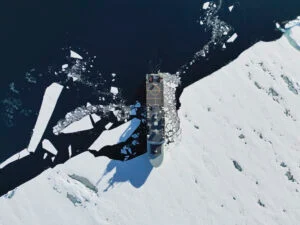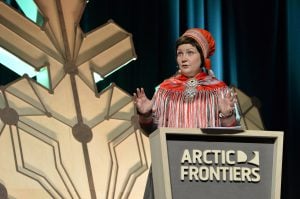
People & Culture
On thin ice: Who “owns” the Arctic?
As the climate heats up, so do talks over land ownership in the Arctic. What does Canadian Arctic Sovereignty look like as the ice melts?
- 4353 words
- 18 minutes
This article is over 5 years old and may contain outdated information.
History

Arctic Ambitions: Captain Cook and the Northwest Passage
Edited by James K. Barnett and David L. Nicandri, Heritage House Publishing, 429 pp., $59.95 hardcover
In 1776 Captain James Cook set sail on his third voyage across the Pacific Ocean, this time in an attempt to navigate the Northwest Passage and find a route between Europe and Asia. The British explorer had previously completed two voyages in the Pacific, during which he’d created some of the most detailed maps of eastern Australia.
Cook’s quest was ultimately unsuccessful, and he was eventually forced to travel south, where he discovered the Hawaiian islands. Historians have argued about Cook’s relationship with the Hawaiians, but the most popular belief is that the islanders welcomed Cook because they thought he was a god.
Whatever the Hawaiians really thought of Cook, many cartographers today regard him as one of the most influential explorers in history. Still, he remains a mysterious personality. As Nicholas Thomas, the director and curator of the Museum of Archaeology and Anthropology in Cambridge, England, writes in Arctic Ambitions: Captain Cook and the Northwest Passage, a beautifully presented anthology of 18 essays published in February, “There has been much myth making about Cook the man and Cook the navigator.”
But enough is known about Cook’s work and legacy to be detailed in Arctic Ambitions, which complements the March opening of an almost 700-square-metre exhibit of the same name at the Anchorage Museum, in Anchorage, Alaska.
The essays, written by professors, historians, archeologists and anthropologists, cover subjects such as Cook’s life, his navigational techniques, his interactions with indigenous peoples and his personal journal in great detail. One of the contributors and the writer of the book’s preface, Robin Inglis, a former director of the Vancouver Maritime Museum and research curator for the project, hopes the book will help shine a light on what he considers was Cook’s most “underreported and underappreciated” voyage.
As revealing as the retelling of Cook’s travels is, however, it’s far from the most thought-provoking aspect of the book. That comes closer to the end, with the essays more relevant to modern discourse on issues surrounding the Northwest Passage. These range from topics such as sovereignty over the Canadian Arctic archipelago to what Inglis says is the most significant debate today — the environmental destruction and cultural interference in the area. He argues that the use of the notoriously hostile Northwest Passage as a commercial route will lead to disastrous effects and raise security concerns for Canada, a problem that needs to be dealt with proactively.
Although text-heavy, the book features about 185 photographs of artifacts, drawings, paintings, and, of course, maps that relate to Cook and the Northwest Passage. It is a book clearly made for the historical enthusiast but is visually appealing enough to attract casual readers with the faintest interest in cartography and marine navigation.
Are you passionate about Canadian geography?
You can support Canadian Geographic in 3 ways:

People & Culture
As the climate heats up, so do talks over land ownership in the Arctic. What does Canadian Arctic Sovereignty look like as the ice melts?

People & Culture
Captain Cook Rediscovered: Voyaging to the Icy Latitudes seeks to provide a fresh view on Cook's legacy from a North American perspective.

Environment
The uncertainty and change that's currently disrupting the region dominated the annual meeting's agenda

Exploration
A foremost Amundsen expert shares some highlights from famed Norwegian explorer’s 1903-06 expedition to the North Pole